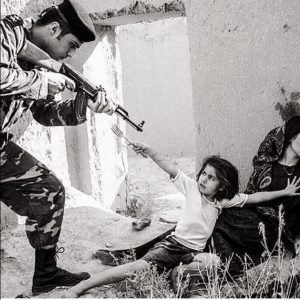Newspaper Article 24/11/2016
Kashmir is one of the oldest outstanding conflicts in the world. The Kashmir uprising dates back to 1947. October 27, 1947, is remembered as the day when India forcibly took over the land of Kashmir and unleashed terror. British Prime Minister David Cameron during his visit to Pakistan said: “Britain is responsible for many of the world’s historic problems, including the conflict in Kashmir between India and Pakistan.” Thus, the Kashmiris are victims of the vested interests of foreign players. The Kashmiris protested at the 10 Downing Street and called on the British Prime Minister Theresa May to raise the issue of Kashmir’s occupation with India. “We are marking the 69th anniversary of the Indian invasion of Jammu and Kashmir, which was authorised by Lord Mountbatten, the Governor General of India to seek attention of the British government which has a moral obligation towards the people of occupied Kashmir. Jammu and Kashmir was invaded by foreign forces in late October 1947 and matter was taken to the United Nations by the government of India and subsequently United Nations Resolution of 13th August 1948 stipulated that the people of Jammu and Kashmir be given the right to self-determination through a free and fair plebiscite.” The protest was led by Chaudhry Yasin, the Leader of the Opposition in Azad Kashmir’s Legislative Assembly and Raja Najabit Hussain.
As per the findings of the Amnesty Report (2010) “since 1989, there have been deaths of 98,274 innocent Kashmiris, 94,180 custodial killings, 117,345 arrests and 106,030 destruction of houses.” Indian leadership and media are trying to project the freedom struggle as terrorism, and silence the suppressed Kashmiris. Indian External Affairs Minister, Sushma Swaraj’s statement before the UN General Assembly Session 2016 that Kashmir is an integral part of India is part of this agenda. India’s coercive policy (under the cover of Armed Forces Special Protection Act-AFSPA) has enslaved the Kashmiris within their own homeland. The current uprising, following the martyrdom of young Kashmiri activist Burhan Wani is being led by the youth. The Kashmiri people are asking for justice but their political aspirations are being deliberately criminalized.
The Kashmir issue, with UN Security Council resolutions in place holds international standing. But why is this so that the Kashmiris’ struggle for self-determination have not changed the conscience of the world. In the past, the people of Kashmir have been denied their right to self-determination and have also been betrayed a number of times. To deny the right of self-determination is like taking the right to live. The practice is in sharp contrast to democratic principles and in a way has fortified the extremist elements. The international community’s ignorance to the sufferings and sacrifices of the Kashmiri people has given a free hand to Sangh Parivar’s strategy in Indian Held Kashmir (IHK). The Hurriyat leadership has been detained; people are being killed, pellets are being fired at them, making them blind/and crippled. Doctors and ambulances are being attacked/targeted. The people have also been socially impaired, newspapers and the social networking sites are blocked.
Peace is about people encompassing political, economic and social reforms. Human security and peace building are inter-linked subjects, both initiatives enhance the security environment. The indigenous character of the Kashmir freedom struggle is a proof of Indian illegal claim over Kashmir, and the doubtful instrument of accession. The political aspirations of the Kashmiri people need a just political solution, in accordance with the UN Security Council resolutions. In this regard, the democracies of world, international organizations and the civil rights groups need to come forward and stop the inhumane treatment of the Kashmiri people. However, if the Kashmiris like the past are left at their own, then it means that the definition of human security differs; and probably there is no such concept of humanity.
Amna Ejaz Rafi
Researcher Islamabad Policy Research Institute (IPRI)
Published in Pakistan Observer, November 16, 2016


